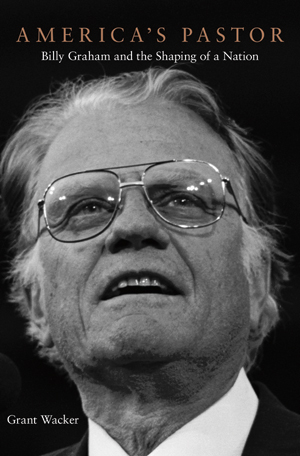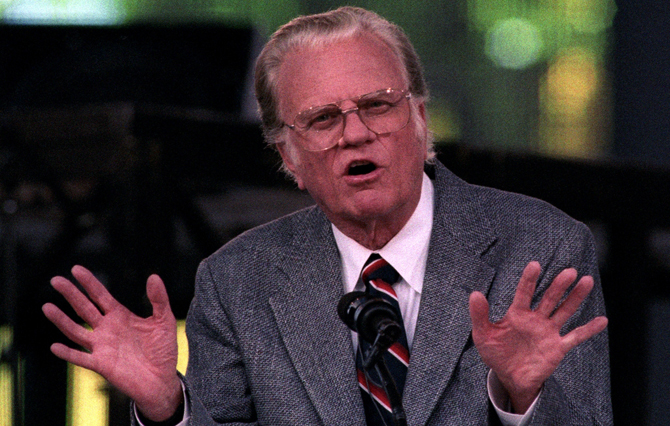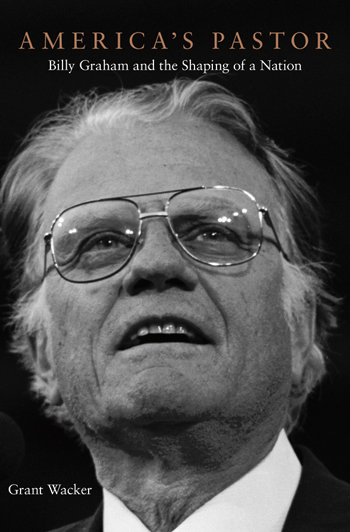The story of Billy Graham -- the North Carolina dairy farmer’s son who grew up to preach to millions and hobnob with presidents -- is well-known. So why write another book about him?
For historian Grant Wacker, the existing books still left some important territory unexplored.
 “I thought that the many biographies already written did not address one of the most interesting questions, which is the intersection between Graham and the American culture,” said Wacker, the Gilbert T. Rowe Professor of Christian History at Duke Divinity School.
“I thought that the many biographies already written did not address one of the most interesting questions, which is the intersection between Graham and the American culture,” said Wacker, the Gilbert T. Rowe Professor of Christian History at Duke Divinity School.
In his new volume, “America’s Pastor: Billy Graham and the Shaping of a Nation,” Wacker explores these questions and also shares his experience visiting with Graham, who recently turned 96.
Graham’s appeal -- particularly to white, middle-class Americans -- and his sophisticated use of media helped make him one of the most powerful and revered men in the nation and the world.
Wacker spoke to Faith & Leadership about Graham and his impact on American culture. The following is an edited transcript.
Q: You say he had an uncanny ability to adopt trends and use them for his evangelical purposes. What are some examples?
He interacted with the Southernization trends. He was always proud of his Southern roots, and he made no attempt to hide them or to mask his Southern accent. He maintained a typically Southern style of self-presentation -- more casual, down-home.
The second way is that he astutely understood the power of media in the post-World War II age. He understood the power of the sound bite, the crisp word, the crisp answer.
He grasped the power of electronic media, so he established the “Hour of Decision” radio and television programs. He also established Christianity Today, which is now the most widely read Christian periodical in the world.
He also was very good with reporters. He was extraordinarily handsome, and virtually all newspaper accounts in one way or another referred to his Hollywood face, his Hollywood looks -- the blond hair, blue eyes and tall and athletic physique. He exercised rigorously, and he was aware of his appearance.
I think the third way he appropriated trends is that he was a great organizer. He organized the Billy Graham Evangelistic Association, and he knew how to find and deploy people who could do what he could not do.
And then I would say that he was very effective at understanding the desire for building bridges. He never used the word “ecumenism,” but he pioneered the practice among evangelicals. He went out of his way to reach out to the mainline, to reach out to Roman Catholics, to Pentecostals, Mormons, Jews.
He went as far as he could, without sacrificing his own message, to emphasize the commonalities.
So unlike, let’s say, the ’70s and ’80s, where we see a deep bifurcation, in the era that Graham rose, there was a desire for the commonality.
Q: How did he influence larger culture?
I would say that what was very important especially within the evangelical world is that his personal life modeled what he preached. And whether or not Americans maintained those standards in their personal lives, they admired Graham for doing so.
He maintained an impeccable record of marital fidelity. His finances were never questioned. He stressed honesty in reporting the figures.
He won a great deal of approval because he refused to criticize or even respond to criticism. He received vitriolic criticism all his life from the left and the right and from all corners, and he refused to respond.
So I think all of these traits, habits, commitments flow together, and Americans saw him as a model for the kind of lives that they would like to live.
Q: In what other ways did he change Christian life in America? Can you say, “Before Billy Graham it was like this, and after him it was like that?”
I do not know of a firm marker. I can infer from a lot of evidence that he was instrumental in changing things in a number of ways.
The first is civil rights. He was not in the vanguard on civil rights, but he was far ahead of his constituency. He made clear that one could not be a Christian and still hold racial prejudice in one’s heart. It’s hard to measure, but he insisted from the early to mid-1950s onward, with great vigor, that racism was sin. It wasn’t just a mistake; it was sin -- and that sin could not be tolerated.
The second way that I think he helped change the landscape is that to become part of the public conversation, evangelicals needed to respect their conversation partners. They needed to come to the table and respect the views of people who did not agree with them theologically.
Q: Which was different from the tradition from which he came.
It was dramatically different. In his early years, he was a purebred fundamentalist. But very quickly in his ministry, he changed. He didn’t change his own ideas very much, but there was very little that he saw as cause for disfellowshipping others.
 Q: Your book has been praised for looking at Graham evenhandedly, although you are an admirer of his and you don’t hide that. What do you think were his weaknesses and his biggest mistakes?
Q: Your book has been praised for looking at Graham evenhandedly, although you are an admirer of his and you don’t hide that. What do you think were his weaknesses and his biggest mistakes?
I would break down the question into mistakes and unproductive character traits. There were two major mistakes. The first and the more prominent one was his entanglement with Richard Nixon. He followed Nixon in the Vietnam War long after most Americans had become deeply skeptical of the warrant for the war.
And then with Watergate, he defended Nixon far beyond the time that most Americans saw that something was terribly amiss. So the first and greater problem was this vulnerability to Nixon’s malign charisma.
And the second problem also related to Nixon. In 1972, Graham was having what he thought was a private conversation in Nixon’s office, and Nixon made scurrilous statements about Jews, and Graham contributed to this conversation by saying that Jews controlled the media, and then he made other odious comments about Jews.
He was drawn into this by Nixon. I know of no other place in his entire record -- among the millions of words he uttered -- I know of no other place where he uttered any anti-Semitic comments.
So those were definable mistakes, and he repeatedly apologized. In later years, he regretted his involvement with Nixon. He repeatedly apologized for what he had said about Jews when it was revealed in 2002.
The character issue is that I think he never fully grasped his legitimating power, how his presence legitimated other people, other causes, and so in that sense he was naive. Now, what also has to be said here is he was a deeply humble man. Everybody said it, and I saw it in my visits with him. He couldn’t imagine himself having this power. I think that’s the heart of it. Nonetheless, he allowed this to happen, and it limited his influence.
He also enjoyed the association with power. And maybe that would be another character limitation. He was enamored with power, with the glamour of power.
For 10 consecutive presidents, he was a constant presence in Washington, and with four of the presidents he was very close. He routinely overnighted in the White House.
Q: Was there a tension in his own life between the ego and the humility?
His vision was expansionist without limitation. He wanted to preach the gospel to everyone, everywhere. He preached to more than 200 million people face to face. And until John Paul II, this was undoubtedly more people than any other person had ever faced, evangelist or otherwise.
I think there is no question that he was extremely ambitious with reference to his work, his profession. He was a very humble man personally, but sometimes those realms overlap.
Q: Graham has been criticized for not doing enough in race relations, yet he’s also been held up as being progressive. What do you think?
He grew remarkably over the course of his career. He started as a son of the South. He grew up viewing African-Americans as people who should be treated politely, but the attitude was paternalistic, and he acknowledged that.
His early crusades in the 1940s were segregated. Sometimes it was self-segregation. Sometimes they were separated by a rope down the middle. That was the evangelical tradition in the South.
By the early ’50s, this began to gnaw at him, and he admonished his own Southern Baptist Convention for their policy of not accepting African-Americans into their schools. And then in 1953, in a crusade in Chattanooga, Tennessee, he saw the ropes out there and he personally went and pulled them down.
He wavered later in that same year. The ropes went back up. And he became more cautious in the 1960s in the face of the rise of black power, but these were peregrinations in an overall trajectory that was without question a progressive one.
By 1982, he said when he was in a crusade in Moscow that he’d undergone three conversions in his life. The first was to Christ, the second was to racial justice, and the third was to nuclear disarmament.
Q: The fear of communism and Soviet power and nuclear weapons was powerful at that time.
The most dramatic change in his life was his attitude toward international affairs. In the late ’40s, the early ’50s, he was a strident anti-communist. Now, most Americans were, and most prominent Americans were, so that’s nothing unusual, but he was among the most strident, and he was unapologetic about it.
By the end of his public career, he became a strong proponent of nuclear disarmament. He felt that the human race was on the precipice of destroying itself, and the only solution was an immediate attempt to mutually disarm.
Q: Was he leading change in American culture, was he influenced by the changes around him, or was he riding the wave of change?
In most respects, he was riding the wave of change, but he was near the front end of the wave. As I said with reference to race, he was not in the vanguard. There were other evangelicals, like his brother-in-law Leighton Ford, who were on the vanguard. Graham himself was not there.
With reference to war, I think he was absolutely at the vanguard. I can’t think of any other evangelical that took a public stand as he did by the late ’70s and the ’80s.
Now, another area where he was progressive was with reference to building bridges with Roman Catholics. He was far ahead of virtually all evangelicals here. Today, that doesn’t seem so courageous. In the 1970s and the 1980s, that was courageous.
Q: How much depth did he have as a theologian and a thinker?
He was not a theologian and never pretended to be. He saw himself as an evangelist, and he defined that as a person who invited others to a Christian life.
He believed that the average person had a working vocabulary of 600 words or fewer, and so he tried to keep his vocabulary as simple as possible, his sentences short.
Now, what was the message? It was boilerplate evangelical theology: humans are broken, humans have sinned, and God has provided the means for redressing that sin through the death of Jesus Christ and resurrection of Jesus Christ. And all the people have to do is accept that gift that Christ has made possible and then to live an upright Christian life. So that was the core of it.
One of his associates said that if you’ve heard 10 of Billy’s sermons, you’ve heard them all. I would say if you’ve heard one of Billy’s sermons, you’ve heard them all, because the actual text of every sermon was John 3:16.
Q: What was the biggest discovery you made in your research for the book?
The most important part of Graham’s ministry for me in the research was the reading of a sampling of the millions of letters that people sent him.
And what one finds in reading these letters is how powerfully he changed the lives of ordinary people. They wrote to him about their problems, addictions, sexual infidelity, other kinds of lapses and failures. They wrote about their loneliness; he once said that the second-most frequent topic of the letters was loneliness. The first would be addictions.
But the majority of the letters spoke of how his preaching had helped them change their lives. It gave them a sense that they would have a second chance, with God’s help. And through Graham’s words, they found renewed courage for their lives.
This was really very gratifying for me. It was very inspiring to see how people viewed him -- ordinary people, the grass roots.
For middle Americans, this is his central legacy, to provide on one hand the role of a priest confessor, someone to whom people could pour out their feelings of failure, but also, and more importantly, a person who helped people gain new orientation in their lives.
The envelopes are amazing, too. Many of the envelopes have no address. They’re addressed just as “Billy Graham,” and they get there. My favorite is the one that had a full address, but then down at the lower left it said, “In case of Rapture, never mind.”










